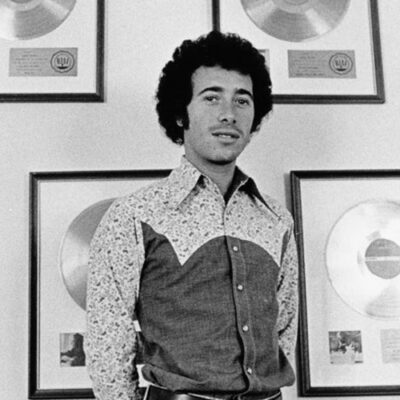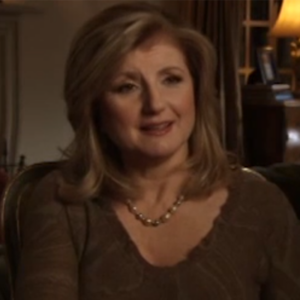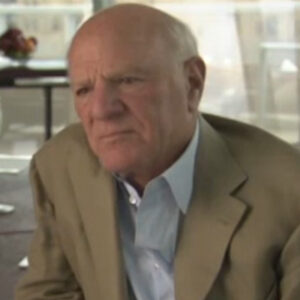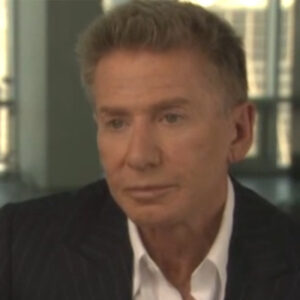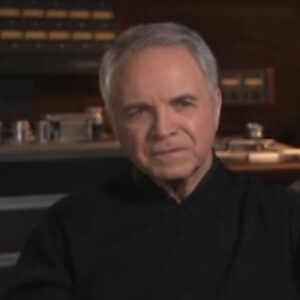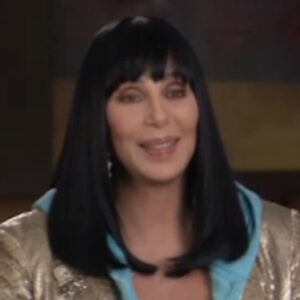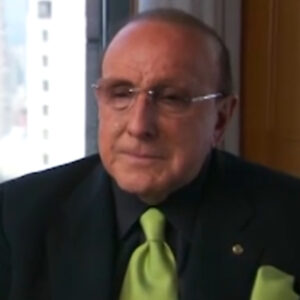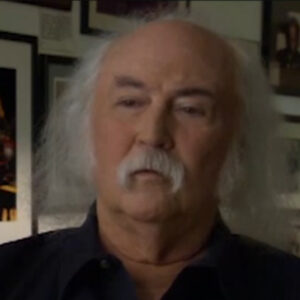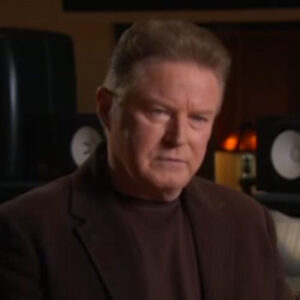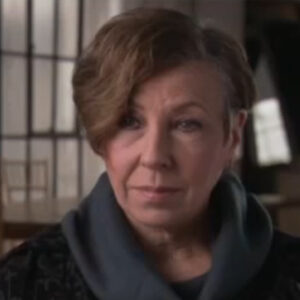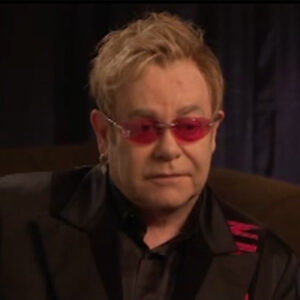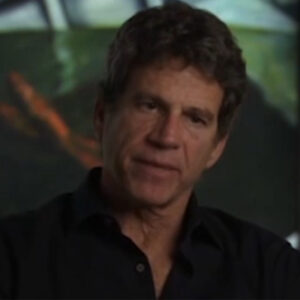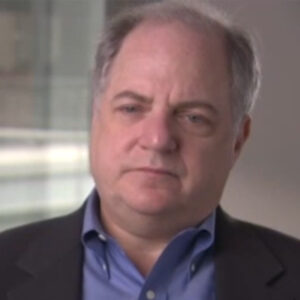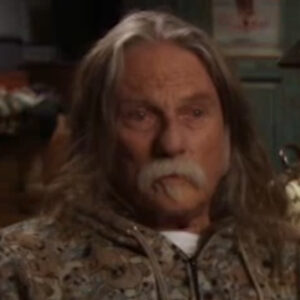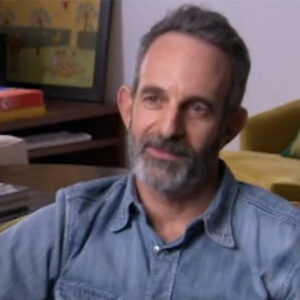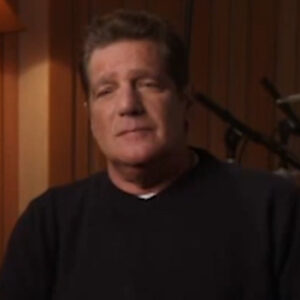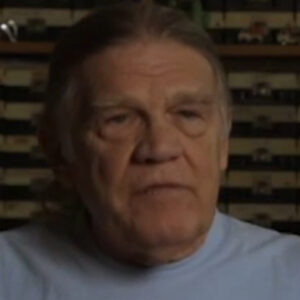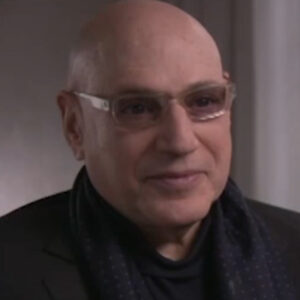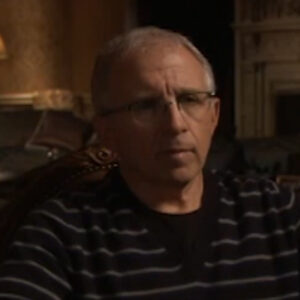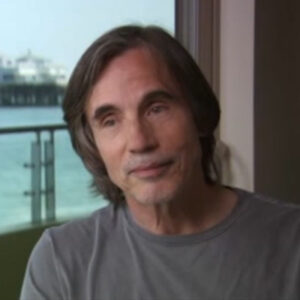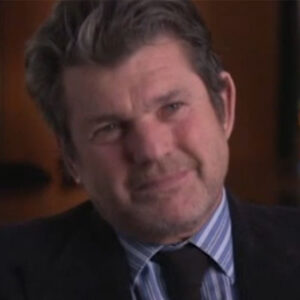Speaker OK, let’s start off start at the beginning. How did you meet David? What was your first impression of him?
Speaker First, let me start by saying I’m really grateful for the opportunity to talk about my relationship with David because there was no one more pivotal or more important in my life than David at the time. He came into my life and I was living in the Bronx at home with my parents. I was a page at NBC. And two friends of mine, Jeff Walt, who is my next door neighbor across the street in the Bronx, and a guy named Hal Ray, who was an agent at William Morris at the time. Help me get a job at William Morris in the mailroom. From NBC, I went to the William Morris mail room, and when I got there, David had already been a legendary figure. He had been in the mailroom three months previously to my arriving at the mailroom. And he was already I think he was second head of television programming.
Speaker And and everybody was talking about David. And we were four days apart. David and I are the exact same age. So at that time there was probably 22. And Hal and Jeff were his real only friends at William Morris at that time because everyone else was afraid of David.
Speaker They were all in their 30s and 40s and David was 22 and he became, in a sense, a mentor to me and that we became very, very good friends. I remember the very first time I went to David’s house. We were in the courtyard outside of his house and he said, Elliot, I want you to hear this is Buffy Sainte-Marie record and there’s a song you have to hear.
Speaker And we went up to David’s apartment, Jeff Hall and I, and he played us. Now that the Buffalo’s Gone, which is this song of Buffy Sainte-Marie. And at the end of the song, you see, he was crying literally, and he was so moved by that song and so passionate about his music. And and that was really an incident that defined our relationship from really from then on. And that music was that important to me as well. And I think he and I oddly enough, though, he was always in a mentor position to me at that time because I was always seeking his advice because he had been through what we were both going through and I had not been through it. And so I I really valued the relationship that we built up from the early days. Then I started working with Johnny and this was much later when we became friends. And during this period, neither of us were in the music business. I was still at William Morris and he was in television packaging. And then gradually over that year, I started working with Joni Mitchell. He started working with Laura Nyro. And again, we all started doing things together and following each other and learning from each other. There were no rules then we had a problem. I had a problem getting a record deal. She had been turned down by all the New York companies. And a guy named Andy Wickham in Los Angeles wanted to hear her demos. And David said, oh, you do what you can get, get out there.
Speaker And I did OK. Yeah, we just need to block you. OK? Yeah. Show a little film or something.
Speaker You know, I don’t have one problem. Oh, really?
Speaker It was great, you know, but he didn’t remember a lot of things. So I would love you to set the stage for when you last. Why was he already a legend? What was he doing? How did he get the job?
Speaker Because, well, you know, some of the stories are well known. The UCLA story, I’m sure he’s told you that.
Speaker I mean, have you heard that?
Speaker He didn’t really tell us that story. Someone did. Anyway, let’s get not.
Speaker Well, I think I’m going to leave that to David, to be honest. I think that’s something that he should tell. I can tell you that we used to go in early in the morning and steam open memos. See that again when he said, let’s meet there. We would meet early in the morning.
Speaker And David on his original application said that he was a UCLA graduate and he found out later on that they actually checked. And once he found out that they checked, we started going in early in the morning to intercept the letter from UCLA. But while we were doing that, we were able to read a lot of interoffice memos and learn exactly what went on in the agency business and how it all worked. You only really when you were an intern there or when you were in the mailroom or an assistant, you had some understanding and there was a specific training role of who was in the business. And you learned who the players were and how to how to deal with them. But the one thing they didn’t tell you is the interoffice politics, which normally you needed years to learn. But David had an accelerated way of learning it, which is to read everyone’s memos and see what everyone was doing. And everyone thought that that was his motivation, but his actual motivation was to find this UCLA letter.
Speaker Were you ever. But I would go with him some mornings and we would meet. And I was just always such an adventure.
Speaker It was always such drama that we were able to build into just doing what we were doing, and when I went to California at first, forgive me for leaving William Morris, but when I went to California with Joanie, we still were in touch all the time. David was still in New York at the agency. And then I would meet Crosby, Stills, Nash and Young. And that that all started forming. And all that time I’m talking to David every day and on what’s going on out in California and what I’m doing and and getting his counsel and his advice and telling him what he better get out here.
Speaker And if this is what is happening, if I can just take it off the hook, just leave it busy work. Stop. Just keep plodding.
Speaker Yeah.
Speaker Just leave it off the hook. Where were we still? Yeah.
Speaker Oh, yes, yes, yes, and I think I did a fabulous lot, frankly, so I didn’t do a very good thing.
Speaker Now, there were a group of you that you all kind of hung out together.
Speaker There were. There was Scott.
Speaker Yeah, Jeff and Larry Kurzon, Hal Ray and Jerry Brant. And these were all the what we thought of them as the young lions of the agency. It was really turning them around.
Speaker And I’m just wondering, does this is one thing? Yeah.
Speaker Or maybe it’s in their little water, it could be the washer dryer, rather, or the washing machine second element.
Speaker I think that this house pretty well. Yeah, there’s a lot of noise in it, particularly people move around. So I think everybody should not move around. OK.
Speaker OK, I’m sorry about that.
Speaker Where were we? Look, I’m telling you, oh, there was a little clique of the young guys, again, that the William Morris agency was in a big transition that, you know, rock and roll and rock and roll music and the rock and roll business were just forming.
Speaker And so they had a very low place on the totem pole at William Morris. And most of the music agents were isolated and treated with some disdain that were the young rebels.
Speaker They had longer hair and there was some speculation that some of them were smoking marijuana and they were rebel. They were young rebels within an agency format. And so they really were set apart.
Speaker And that small group that we were in, we were all music agents, except for David, who was in the TV agency, but he was our age and he just fit in with all of us better. And again, he was sort of a mentor, mentor to the whole group. How was he a mentor? Well, both in action. He was very, very out of the box for the most part. When we started, I was from the Bronx. We were all pretty passive. Tell me what to do and I’ll do it. And that was sort of our attitude. And it was not David’s attitude. David’s attitude was, let’s try to do something different. Let’s do something no one’s ever thought of. What would that be?
Speaker And then we’d come up with it and execute it. And that was always his form. That was always it was not a matter of passive aggressive. It was a matter of let’s come up with things that haven’t been done before while we have the opportunity. And at that point there was the opportunity because the business was just for me. And so there were no rules at that point that we were actually setting all the rules for both. There was no performing. There was not a set up yet. There were no promoters in all the cities. So you were dealing with club owners for the most part or were gangsters? There was the record companies were very stable and rock and roll was a business that was manipulated. And where all the contracts were very against an artist, they were all very punitive for the most part and paid very, very small rates.
Speaker Took your masters, took your publishing and. We thought this is an opportunity to represent people.
Speaker And do it a totally different way. Totally unique way and and we did and we did that when we weren’t even together yet. That was David’s input into both the group and into me as we went on the journey, which really didn’t culminate for another two years in California. But but we still had set the standards of what we wanted to do and what we were as people then. And we had a continuity to it. David and I, even though we were on opposite ends of the coast, spoke daily and we still had a plan and we’re still executing the plan even though we were on different coasts.
Speaker So when David finally came to California and finally we finally cornered me and said, let’s merge, I’m going to become your partner, which is really what happened. It was a joy for me. I mean, it was.
Speaker I can’t tell you that, OK, because this is a really interesting, interesting period before we go forward. I want to talk a little bit about.
Speaker I’m so glad you told me your story. Thank you.
Speaker It happened again with Jackson.
Speaker I’ll tell you that story in a bit just in terms of the chronology here. I’m not want to be a slave to chronologies, no, no, no, no, my memory’s as vague as one could be with you.
Speaker You actually left William Morris and went to Chartoff Lincoln before you went out to California, right? I didn’t get that important. But you were in New York when you met when you went to your job and that changed your life?
Speaker Well, yeah, I had just been hired from one of the great advantages of being a William Morris is that everyone else in the entertainment business at that point in time would be looking for William Morris employees as people who really understood and knew what was going on. That was a great training ground and it really was. And they would post and the William Morris locker room in our intern locker room post jobs. And one day there was a post from Bob Chouteau, from Irwin Winkler, who had a company called Chartoff Winckler, and they were looking for managers. And I answered I went up there and interviewed for the job and I got the job and I thought I was a manager. And what I didn’t know at that particular time was that Bob and Irwin, Chartoff Winkler had just made a deal with MGM and were producing the Elvis Presley Goes to Hawaii movie. And we’re moving out of management and we’re moving into MGM studios and we’re negotiating a long term production deal at MGM. And they were looking to break up their company, which I didn’t know that I was hired because I think they hired the most unqualified, inexperienced person they could find. And they had six or seven comedians. And Buffy and I had always been a huge fan of Buffy’s, actually. David had turned me on to Buffy. But from that point on, we were real big fans. And Chartoff Winckler managed Buffy. So they had a bunch of comedians got Hendron, Arlit and.
Speaker I’m still around Marre Cherian and.
Speaker Um.
Speaker It was a great experience, but I I remember a hundred dollars used to call me, call me in and we’d have these meetings and one day Jerry Stiller and Anne Marie came in and they went, oh, Elliot, Elliot, tell us what to do with our careers. And that was, in a sense, a sense of humor. I had no idea what to do with the careers.
Speaker I’d never worked with a comedian before and I had no idea. But they had Buffi. And so I gravitated to Buffy. And Buffy said to me one day, Joni Mitchell is playing at the Cafe Agogo. And I knew that Buffy had just recorded a song of Joni called Song to a Seagull, which was this great song. And I said, Oh, great, I’ll go down there. And I went down that night with her last night. Joni’s last night and. I can’t describe what the experience was like hearing her set, but I went up after after it and I said I’ll I’ll do anything I can to work with you. I’ll do anything. I’m a manager and I work with Buffy. And Buffy told me to come down here and and Joan was leaving the next day to Detroit, Michigan, on a tour. She had booked a four week tour, and she did it all herself. She booked it herself with club owners. She traveled with herself. There was no one else whether she just had a guitar and went. And I said, let me go with you. And we met at the airport the next morning in Detroit. And I did a month tour with her. And at the end of the tour, she asked me to manager. And I went up to explain to Bob and Irwin that I wanted to quit and then I was going to go to California with Joan and they were amazing about it. They said, we get it. We’re going to be out there. You can use our offices, we’ll help you. And they were really most gracious. And to this day, Bob and Irwin have remained really good friends.
Speaker So it was such a second that I was saying to a single.
Speaker Yeah, that Buffy had recorded it, thought it was several, you know, a circle game was Tom Rush.
Speaker I have gotten that story. He said he that simple thing. And he called Buffy and said, God, I love love my favorite song, I suppose.
Speaker Yeah, I did. Yeah. Yeah.
Speaker She recorded as well the the the one that most people I knew at that point was. Yeah. And Tom Rush to circle the to was the big radio recording of Circle.
Speaker Yeah. I know. You just don’t want to forget this one because we want, believe William Morris all together. But can you just tell us a couple of really wonderful anecdotes about what happened between Morris when you guys were there? We need to set the stage a little bit about how David got his beginnings.
Speaker Well, you know, by the time to be honest, by the time I was in the mail room and by the time I left the mail room, I think David was head of TV packaging by that time and had made the Thomas deal with Danny Thomas production company. And that was huge. Then television in those days had only a few networks and Danny Thomas had a bunch of primetime shows and it was a huge coup for David. And and again, it was something that was totally out of his element that all that took creativity to get to put together, to sign, to sign the Thomas spelling and.
Speaker So his cachet within our group with it was very high. We all knew that David had a style and panache, that creativity that we didn’t we were building to, that we realized you can be creative in this. It is a creative industry and the smartest and the brightest are going to be the most successful. And it wasn’t the most political or, you know, it just change the rules for all of us by watching his progression is really what it was. It was just he wasn’t political. He didn’t have friends higher up, everyone higher up as afraid of him. But he did it because he was more creative. He was a little smarter and not smarter. These weren’t smart men. He was just willing to lose. He was willing to take a chance. And he did fail occasionally. But again, the incremental failures matched against the large successes are just so minimal that you don’t think of them on any level. But so we all gained from that. We all saw there was a different path. We could take the different path and be equally successful.
Speaker Now, you both came, he was from Brooklyn, you were from the Bronx, and neither one of you came from a background that would have naturally led you to entertainment, I would imagine, when you were talking together and you were, you know, going out and talking about your futures and plotting it, let’s do something special. Let’s do something new. Did you talk about your childhood? Did you talk about where you came from?
Speaker No, we never had to. I always knew that David and his mom were close and what his background was and David always knew what mine was. Our parents were both immigrant parents who did not have a clue of what David was doing or what I was doing. Didn’t really understand how successful we were when we were or didn’t know the path. So we had a lot in common from day one. Again, even when David was on TV and I was still in the mailroom.
Speaker David was fast becoming my best friend and we had no idea that we would be in business with each other or that our paths would continue to meld and metion. But that really wasn’t a thought that we just gravitated to each other. As I was just moved out of my house, he had just moved out of his house. I was living in the village. He was living in Lower Manhattan was our first forays out. And we just naturally gravitated to each other, I think we both saw each other’s strengths and weaknesses and there was.
Speaker No paranoia on either one, and that was important in those days because we were making relationships that would last for a very, very long time and we didn’t know why yet.
Speaker And let’s talk about Laura Nyro for a moment, David. I understand the story, he was now an agent and he went out to Los Angeles. I think you were already there. And one of those trips, somebody I can’t remember. I told him, maybe told him the story about Laura Neuros bombing at Mojave and that she was hiding out in New York and he heard her music. And what I’ve heard is he raced back to New York, found her and said, let me be your savior. Do you know the story of how he got to know?
Speaker Yeah, that’s sort of how the story is. And then we used to go to Laura’s house all the time. Tell me the story.
Speaker OK, you know, I think and again, this you should have you should hear this from David. Not for me, but David was in love with Laura, and I think she was in love with David actually at that point. And we used to go to David and I would go to Laura’s house and she would play the piano and we’d, you know, go out and eat or play around or she would torment us and he’ll tell you the story about he and I went to her house. She invites us over to the house. Come on, let’s hang out. We get there and she won’t let us in. And we’re outside of the house, her apartment, begging her to please let us in and stop torturing and tormenting us in a good way.
Speaker It was all in a good way.
Speaker And she was just the most fun and such a great artist. And at the same time, I was working with Joni, he was working with Laura. And there was so many similarities in both personalities and the two of them. Well, you loved that she was wild. And she’s an incredibly sexual and one of the sexiest women I’ve ever met. And she was not an attractive woman, but there was no one sex here. I mean, when she started playing and she would throw her hair back and she just took on this persona that was just so unique and so powerful and so sensual. And she was like that off as well. She was a real girl.
Speaker Laura loved being a woman. And and I think she just really captured David’s heart. He was obsessed by her. He did everything he could for her in every way. He tried to protect her every way he could in his mind for what he can do for her. How did he describe her music to you when you talked about. It was a passion he always used the word passion to describe her music because she was so passionate about it and again, very similar to Joan and that they were both considered themselves artists.
Speaker From the very word go, and so we thought we were very lucky and again, meeting those two girls first as the first two clients we both had that David had and that I had it, when people ask me, even though I’ve been with Neil Young now 41 years, who’s the biggest influence and what’s the biggest influence in your career and how you forged a company and why you fought for artist rights and why you’ve never had contracts with people. And and it was Laura and Joni, and they actually shaped how we thought the business should be run and how we thought artists should be treated.
Speaker You know, when I think about it as just, you know, journalists, historians, documentarian. I’m blown away. I mean, two of the greatest female singer songwriters, the. Our century and you have one.
Speaker And you know the history, you know, the truth is, I think even at that time we sense that we knew we were lucky, we knew we were working with that. Our calling wasn’t to work, to be BS, to be worker bees in a hive, that we had a slightly higher calling. I know this sounds bizarre, but I really think that we both felt that way.
Speaker I don’t know, it’s people like him.
Speaker Everybody, this is heavily a house, and if I can sit here and be not move you off, said, don’t move, don’t move, because I’m hearing every single sound.
Speaker Sorry.
Speaker It’s OK. I just forget where I am. No, know, it’s just I really I this is something I don’t want to do themselves. OK, so come on, where are you going to get a.
Speaker OK, just because you might as well.
Speaker And you know, another thing about this period, you have to remember that I remember now is that we were obsessive, we had no relationships, we had no girlfriends.
Speaker You know, he was in love with Laura, you know, I was committed to Joan, we were both just left our homes in Brooklyn, in the Bronx and were living in Manhattan. We just moved out. What then? We just got to I just got to California. David was still in New York.
Speaker And so we were on this odyssey and we understood it.
Speaker We related to it when it happened. We knew we were lucky. And we followed the muse and tried to have both Jonah and Laura as a muse was.
Speaker I don’t know what the right expression would be other than.
Speaker God sent I think there’s something to that. I mean, you must have and love that you said you’ve sensed it because. No, you couldn’t. I mean, they were they were both such geniuses, and here you were and but. And I would love you to talk about this, despite the fact that we look back and we know it and you knew it, they weren’t easy sells neither one.
Speaker No, it was very hard. Again, it was a strange period of time in music.
Speaker You know, rock and roll was coming in. The folk movement had died. Singer songwriters were not what was happening at any level. At that point. It was pretty well Tin Pan Alley still.
Speaker And it was a hard sell.
Speaker It was hard to get a record deal. David made a record deal for Laura at Columbia, and I had a problem getting a record deal for Joni again. And we were turned down by MGM Universal, all the major companies in California at that in New York. At that time, there was only one company in California, MO had just started Reprise Records with Frank Sinatra, oddly enough, and one of the guys, Andy Wickham, reprise New Joni and knew that all these people were recording her songs.
Speaker And had heard that I had a demo of Chance and invited me to come out and I went out and I played it for Ian Moe and. And then we came back and then we went out there permanently and never came back to New York. Is it true that Laura was gay?
Speaker Not that I ever knew she was one great kisser, but whether she had affairs or not, that was in a book that was maybe in later periods of time. In that period of time, I would have thought that none of us was sexual.
Speaker Sex was always a cool thing, but it was not we were not these 20 year old hyper driven let’s have sex tonight, we were much more obsessed with the opportunity that we were both given. I mean, I know that I sensed that I won’t speak for David, but I can tell by his actions that he more than sense it because I followed his lead, that we were in this unique life situation, that we had a chance to do something that would be literally that would change our lives. So, I mean, I don’t remember even dating then. I’m sure I did. But it was not an obsession on any level. The obsession was working with Joni and getting it to the next level and figuring out how to do that. And again, we made a ton of mistakes. We were learning about what record deals were and what a publishing deal was. And we were in the middle of a huge learning process, negotiating and sitting down, dealing with lawyers and people who have been doing this forever. And again, neither of us had been to college. I mean, I had been at Bradley University and he’d been at UCLA. I was kicked out for leading a civil rights march. He was kicked out. He just left. And so we were on this continual consistent learning curve of learning all of these businesses that we were responsible for doing.
Speaker So it really wasn’t driven by and I think Laura was the same way. I don’t think she had in the period that we were taught that we’re talking about, and I don’t think she had any. Gay experiences, I don’t think David did. I don’t think, you know, I don’t it wasn’t a priority.
Speaker Crosby. David Crosby was quoted.
Speaker They’re saying that, Laura. Was a window into something at that gathering that was not primarily about money. This is a really interesting statement. Well, again, I think he was in love with her, but there’s more to it than. There’s something I’m trying to get you.
Speaker David, I have to say this to David has something of a difficult time of putting himself back in that period and being able to remember the young guy who heard war in Europe first way.
Speaker And something touched him about that music that.
Speaker It’s I I don’t think you can separate the two, the feelings he felt for her as a 22 year old who has not had up until that point, nor had I that many relationships.
Speaker So I don’t think you can discount or. Dismiss the fact that he was in love with her or that.
Speaker He had feelings that were new and were different as I was having it that same period of time, we were in our early 20s, I mean, I think we were both 22 is what we’re talking about right now.
Speaker And there were a lot of feelings, a lot of growing up.
Speaker I’m talking about the music, no doubt.
Speaker Well, again, you can’t separate the music from the soul, the music, her music touched him in a place that he hadn’t been touched before, the same way he had been touched by Buffy, the same way he had been touched later on. And I told you the story that he called me one day he went, oh, God, I’ve got this demo from this kid, Jackson Browne.
Speaker He sent me a demo. Elliott, when you come in tomorrow, I’m going to play this song. Adam was a friend of mine. You’re going to cry. And he was so moved by that. And I walked in in the morning and he he had it in the machine and he was excited to play that as any any deal that we had made. And I had seen that in him and a couple of times. So I don’t think he could separate Laura and her writing and her sexuality and the emotion that she brought out of him and how she counted on him. And she counted on him a great deal in that period. She was, again, slightly damaged from Monterey and wasn’t in demand live and her concerts didn’t do well initially.
Speaker So I do think she brought out feelings and David that he just hadn’t had before. She awakened feelings that he hadn’t had before. And, you know, only David could answer to this. But I think she was his one of his first loves. And it was a combination of her as a woman. She was this very, very beautiful in a different kind of a way. You look at a picture and you might not think she’s very, very beautiful. She wasn’t that tall. She’s sort of short. She’s like five, three. And she was a little heavy and her features were very idyllic.
Speaker And what it you to do for her career?
Speaker Oh, everything. He made her publishing deal and made her independent. Actually, he gave her an independence. And with that independence came another level of creativity of not having to write or write for a mainstream or write for anything. She was able to then just purely write for herself and what she felt. And and that was the gift that David gave her. And I think that was what he was most proud of at that time.
Speaker Were you at the Carnegie Hall? Yes. Can you talk about that was sort of a triumphant return.
Speaker It was. We had done a concert actually a month or two before that. It was the day that Martin Luther King was killed. I don’t know if he tells the story, but Joni and I went with he and Laura. The four of us were in a limo going up to I think it was Pennsylvania. Laura was doing one of her first shows. And David was a nervous wreck because he had never managed I mean, he had made all her deals and had made her own independently, financially independent. But he didn’t know anything about lights and sound and what to do with the gig. And, you know, so he asked us to go and we all went together.
Speaker And it happened that in the middle of the ride, as we were in traffic going through town, I think it was through Philadelphia news spread about Martin Luther King being assassinated. And we went and played that show, it was the first show, but I remember there was a bunch of people around the limousine and people were crying and. Was pretty horrific, and that was actually the first time we all went to see Laura alive with that show and and we did the show and then we all talked about it on the way back and. And it was to then for David to from the very beginning to Carnegie Hall, which was in fact a tremendous triumph, and one of the great shows and the reviews to that show, I remember were just inspiring just to read. Never mind. See the show. It was a great.
Speaker It was a great triumph, is it true that it was David’s idea to shoot her in this very, you know. A lot of black around your spotlight and put a rose on the piano. Yes. Can you tell?
Speaker Well, it’s actually a thought. She always like to wear black. And it was just one of those things that David, in fact, is a picture of David in the pool with a rose in his mouth. And if you know that picture that David was pulling roses out of a lot of places at that time and it was his idea, he said, wow, wouldn’t it be great if you just had the rose in the light? And again, he was a big part of Laura. He was a big part of Laura’s creativity in that she balanced everything off of of David.
Speaker I’m jumping ahead a little bit now to leave the subject of more of it when he started asylum and she did not sign with the label. OK, can you talk about that?
Speaker It was again, David really should speak to this because only he knows it was a dark time for us. It was a very depressing time.
Speaker He was losing the love of his life. It wasn’t just about her coming to asylum and losing her.
Speaker As far as the talent we already had, asylum was already a pretty cool. And we already knew the artists we had. We already had the Eagles and Jackson and Tom Waits and we knew we were forming. I mean, we already had a lot of demos, people we wanted to work with. But I think he did get his heart broken at that point when she didn’t come and their relationship suffered, and I think there were a lot of people who were telling her that bad things and giving her bad advice. Because by by that time, it was no longer the four of us, Johnny and I and and David and Laura. By that time we had a lot of people in our lives. We had a large Crosby, Stills, Nash and Young and a lot of other people. We had a larger company. And Joan and. And so there wasn’t that time the I think they just grew slightly apart in that.
Speaker We were doing so much more than you just didn’t have that one on one anymore and the relationships, as you know, and all your lives, when you get to your 20s and in your 30s and people have relationships, they change. You have partners. Phone calls are less those 11, 12 and one o’clock, two hour phone calls become, well, I’m now with someone you really shouldn’t call after 10:00. We’re sleeping and life changes. I mean, things change, circumstances change.
Speaker And I think unfortunately and that was a really hurtful time, there were a lot of there was a trust issues. There were a lot of people who were putting David down to Laura. And I think that Laura accepted any of it when David was so and in love with Laura. I mean, there was nothing that he wouldn’t that he wouldn’t do for her or protect her from from David’s point of view, someone else would look at it and perhaps see it differently. But, you know, I personally couldn’t see how you could. But but I think the fact that Laura stopped trusting him 100 percent. Why did you stop?
Speaker Again, I think people around her where, you know, the publishing deal this and your record deal that, and you should have your masters and you should have maybe a higher royalty, or I think that once you aren’t spending that much time in the relationship, these little things creep in. And I think there was just a little bit of distrust that crept in. I really don’t know how else to explain it, to be honest with you, because there was no tangible reason for it. But having had relationships that have ended after 20 years or 10 years, I know how it happens. And it’s always sorrowful, but it does happen.
Speaker So, yeah, I think it was it was, I think the biggest.
Speaker But it broke his heart. Yeah, without question. It was again, I think it was his first great love.
Speaker Oh, um, OK, now.
Speaker Blah, blah, blah, blah, blood on your chin to find.
Speaker OK, now you’re in California, you’re getting this record deal for Joni and you’re talking to David every day. When they call him up and he said, you’ve got to come out here, they’re band starting left and right, right.
Speaker That whole music scene right after I went out with Joan the very first day in the studio, and David Crosby was producing Joan’s first album, the very literally the very first day in the studio. John and I are in the studio and an engineer casually mentioned the Buffalo Springfield are in the room next door. And Joan says, Oh, Eliot, you’ve got to come with me and meet Neil. You’re going to love this guy. She knew him from Toronto and they had been friends from the folk circuit and they’d spent a lot of time together. So we went that after jam session, we went into room B. Knock on the door and the Springfield are in there and Neil’s in there and. We go out to dinner that night and I’m living on the floor at B Mitchell Reid’s house at this time, and Neil had just taken a house with this woman and QIO for rent and he says, hey, you can rent the room at my place if you know you’re sleeping on the floor. Anyway, within like three weeks, I was working with the Springfield and I could tell they were breaking up. And I had already started a. Felt that Neil and I were really in sync on just about everything that we thought and we thought we were starting to have a very, very close relationship. And I’m talking to David all the time and their break, you know, and then Crosby and Stills, Stills and I have a good relationship and they’re starting and then Graham comes into town one day. We all go to the to the whisky and he comes over to Joan’s house. By now, we’re all living in Laurel Canyon. And and I’m telling David, you got to get your ass out here because there’s all these amazing, not good but amazing artists. And I can only do so much. And I need your help. Come on out here. And over a period of time, he did. He came out and over a period of time, weeks and months, it wasn’t very, very long. But by that time, Crosby, Stills and Nash had been formed. I had formed it with David and David had to do all the negotiating for us. And it was a very hard thing to do. And I had called David and I said, listen, I’ve got the Buffalo Springfield on Atlantic. I’ve got Crosby on the birds, I have Graham Nash on a Universal. I’m dealing with the people and I don’t know how to get them off of all these labels. David said, you deal the band, I’ll leave this to me and I’ll come up with something. And he did. He came out, we barnstormed and he came up with all these trades and he negotiated with Ahmed and with Clive. I think it was Walter Yetnikoff. Yeah, I think it was actually Walter and then Clive. Yeah. Because I think Walter was still there when Crosby was a bird, so he needed the birds released. Then Walter left. Clive came in and that’s when Pocho he made the rest of the of this of these deals to actually free these artists. And we got Stephen off, Stephen and Graham and David on Atlantic. We got David offered Neil off Atlantic on to Warner Brothers, where I was able to make a solo deal with Jerry Wexler. Story with Jerry was again was an important to David. He dealt with David much more than I did. Jerry was a friend, but he he did a lot more business with Neil. So I don’t really know the Jerry story.
Speaker The story goes that when he went in to get, uh, I guess it Steve still went into Atlantic to get stills of.
Speaker Yeah.
Speaker He was going to bring the band to play. Because Clive had a couple of the artists you need to get Steven out of Atlantic Coast, Jerry Wexler to get Steven out of the Atlantic, and Jerry Wexler physically picks him up and throws them out of his office the next day. And hearing about this calls David invites him up and says. Very sorry he was treated this way. Can I do for you? And by the time that meeting ended, it got Crosby, Stills and Nash and he had to go back.
Speaker OK, that’s slightly true.
Speaker What it was, what it what actually happened there.
Speaker And that did happen with Jerry. But Ahmed Ahmed wanted Steven and David and Graham and he was willing to trade Neil. He wasn’t in the picture. He. No, but Neil was Neil was under contract to Atlantic and Neil is in the Buffalo Springfield, which was in Atlantic Act. I got Neil off. And the way we got Neil off was through David promising that he could deliver Crosby, Stills and Nash because we were doing this simultaneously. Remember, I’m dealing with Warners and he’s dealing with Lanark.
Speaker And again, we were all doing this with in concert with David at the front, so Ahmed dropped Neal. He didn’t let him go. He dropped him so that I could make the deal. So Neil was let of Atlantic free, we paid nothing and got nothing, they got nothing for it. They actually just let Neil go. And then I was able to make the deal with MO. Which we did at that very, very same time, so you remember Neil’s first album came out the same time as Crosby, Stills, Nash and Young’s first album because they were recorded simultaneously during the day, Neil was doing X and Y, and during the evening he was doing his album. But the first Crosby, Stills and Nash album, which went to Ahmet David totally negotiated and made it happen and it couldn’t have happened.
Speaker I didn’t notice that, Neil, that this is really.
Speaker Yeah. And again, David, I couldn’t I didn’t was not able to figure it out. I mean, I literally called David and I said, how do you get these three different labels? And I’m telling you, it was done in a week.
Speaker Literally, it was done in a week, he figured it out, not just figured it out, did it?
Speaker They had to go back to Clive and say, oh, by the way, you’re not getting anyone, Clive got nothing.
Speaker Well, later on, Clive got Pocho with from Ritchie, who was also on Atlantic, and Ritchie was in the Buffalo Springfield. So it was quite pissed. Yes and no, he was, but, you know, again, Clive is a player and Clive is very young then and was on a you know, Clive was Clive from the word go. You know, if you’re doing an American Masters on David, you obviously must have done one already on Clive or you will.
Speaker But again, he was a very important. Cog in that wheel, but he got nothing from David. What you they remain good friends. Yes, I think so, yeah. We all like Clive, you know, a great deal of respect for people who have to write about stuff.
Speaker So you read about all these feuds in this because people have to have something right there. But the truth is, my sense is everybody was just doing business.
Speaker Yeah. The word feud a little over you get no. And it’s like, well, there’s a feud. No, we took no because you dealt with the same people over and over. It’s a very small businesses, you know, and you got to know from Clive once you’ll get a yes next time, but you’ll be dealing with him again.
Speaker And it’s the same now. It’s no different now. It’s a very small business, there’s only a few companies and we all know who they are and we all know the players, so feud is a little over. You know, you’re disappointed at times you believe in something and you can’t convince someone else. And you’re disappointed, but it’s not a few. I don’t think David really feuded with anyone. Again, you do this long enough, you deal with people over and over and over, unless you really don’t like dealing with them, in which case you don’t.
Speaker Talk about David and how he looked up to Ahmed and Ahmed thought of him as a son to. I’d never had children.
Speaker Um.
Speaker Both Ahmed and Mika really love David, and he loved them, you know, Ahmed was the high road guy, Ahmed we all aspired to be Ahmed. When Ahmed came into a room, everyone went, Oh, it’s Ahmed.
Speaker He could have just screwed the hell out of you. And he often did. And yet he he was always Ahmed. So we all had this pedestal that Ahmed was on. And again, he was someone we all aspired to be, someone who was creative, who had done so much. And yet he was such a class act. He was such a nice man. And and he loved new artists. At the height of his fame, he he was still out at clubs looking for things. And that’s what we wanted to be. That’s who we wanted to emulate. We wanted to be 50 and still as much into it as when we were 20. And Ahmed was Ahmed at 60. Ahmed, unfortunately, his death was a you know, the day before. Was it a Rolling Stones concert where he fell down the stairs and went into a coma and died? That was like, what more can you say about Ahmed than that? Literally, he was just someone that we all. Aspired to be the Atlantic story and the founding he and Wexler and Essawi, they were all such class. You know, David, I was so lucky to get to know those people and have them let us into their world. We felt we were so fortunate that, you know, maybe they think we’re were in their cloth, you know? I mean, that’s how we sort of thought. And so we were so lucky and again, thought of David as his son. He was so proud of David. He was so proud of his success when asylum when we started asylum. And he was so proud that David was able to make that a big label. And and again, though we were partners in asylum as David’s label.
Speaker Well, what I do know that starting his own label was actually, you know, we made a bet on it. You know, you made six years.
Speaker Oh, I that I did say. Yeah, yeah. And that was wonderful. Yeah. But not everyone. I Jerry Anatsui, my blog double again.
Speaker I mean, we said at the end of it, you know, we were just about finished the film when when he died. And I became very close to it and I’m still very close to him. And we said at the end of the film that, you know, he’s ending no self respecting screenwriter would have written that ending. Yeah.
Speaker You know, but it was perfect in a way. It was. I mean, it was so sad to, you know, um.
Speaker OK, now.
Speaker I don’t have to go through all this hard career a little bit, but anyway, he ultimately.
Speaker Left Ashley Davis moved to California, and that’s when you guys started management business. Give us the background on actually starting that business. How did you talk you into doing that?
Speaker Um, we were in and I picked David up. Here’s the exact night it happened. I picked David up. We were going to call Gottlieb’s house for a birthday party. Carl Gottlieb wrote Jaws. He was a screenwriter for Jaws, was a friend of David Crosby’s, and I’m a friend of David in mine. And I picked David up at the house and we pull up to Carl’s house. And as I’m about to turn the key off and get out, David turns to me and he puts his hand on me and he says, Elliot, we’re going to become partners. We’re going to start a company called Jeff and Roberts. It’s going to be amazing.
Speaker And at this time, I’m managing Joni and Crosby, Stills, Nash and Young.
Speaker And I have one or two young managers and the trainees, and I’m doing great and I’ve got David’s guidance and I’m for a second there, I think why would I want to partner?
Speaker And I say that to David, Why would I want a partner, can’t we keep it the way it is and easily think about it for 30 seconds if we’re together? Am I going to make you a lot of money? Are we going to do great things? Think of it for one minute.
Speaker And I go, OK, yeah, yeah, yeah, yeah, yeah, and by the time we went into the house, we had hugged shake hands and we were the next morning we started Jeff and Roberts. So he didn’t it took David around a minute and a half to talk me into it, frankly.
Speaker Well, tell us about Kevin Roberts, I mean, what did he tell us about your office, what looked like the Neil Young’s piano in the corner? I mean, all this kind of stuff.
Speaker Just wait one second. Let’s. Oh, troublemaker. Um.
Speaker Let me just say, here’s what Jackson Browne described in an industry for cannibals. It was like the infantry coming over the hills you to.
Speaker Well, we had a lot of people hanging, there were always a lot of musicians, and because we were forming a lot of bands at that time, the Eagles were Linda Ronstadt band.
Speaker Linda was one of our first asylum and. Pocho with just forming and America was just starting and Jackson was just starting and there were.
Speaker Judy Sill and Tom Waits, there were people constantly coming in and out and it was always open and people were playing and we were very open to musicians and it was where bands came to hang and to hang out.
Speaker And we had a piano in the waiting room and we had guitars around. And it was very, very open and pretty unique. It was very much like the period and it became the template for other companies then started doing and, you know, the term artist friendly. We were beyond artist friendly and it was just a great experience was. Because we were actually making deals for all these people, they weren’t just hanging out, um. So it was a lot of fun, look out then it was Jeff and Roberts, it was on Sunset. We had just taken over the old Monterey Pop offices, Lou, and had just done Monterey Pop. And they were just moving out and we took over that building.
Speaker Um, what attracted you to an artist, how did you choose this unique someone that was unique and that was the first criteria?
Speaker You know, in that period, singer songwriter is what? Anything that moved us that a spoken word, a line is really what David and I were always about and always were from the very beginning, probably because of our training with Joni and Laura, that it was always about the song. It was always about the spirit.
Speaker And that never changed, we were always about the song, you know, we were always about originality, we were always about trying to find something that was unique.
Speaker How did you guys complement each other? Very different.
Speaker I always thought we were very much the same. And yet there was such a difference. There was never any paranoia.
Speaker I always envied David. I never was jealous of David. I always look to David. I don’t think for one moment he was ever paranoid of me. I think he always respected me. I always felt that. And and that’s why it was so much fun, frankly. We looked forward to it. I came in early every day because it was always so much fun to be there that it was just the place to be. And we weren’t in Laurel Canyon at Joan’s house then, you know, the party and, you know, followed the next morning at the office and people came by and that’s where everyone hung out, hung out.
Speaker Finally, some of your favorite stories from that time, um.
Speaker Gee, you know, I’m really bad at specific stories.
Speaker I feel like Warren Beatty here for a minute. I’m very that story you tell a story and I can embellish it for you, but I try I don’t really remember very.
Speaker Yeah, not not really, I mean, not, you know, specific oh, that one day that there was very every day was was a carnival and every day was something special. And again, every day we you know, we’re starting the record company than doing the record company, then selling the record company then and building our management company. There were always something getting into films.
Speaker And then David was, you know, always getting into someplace else and started to love the idea of movies and wanted to work with Ted Ashley. And, you know, so, you know, things were taking shape then and. You’re jumping up and jumping for four years ahead.
Speaker I don’t really have any great stories of any specific day that somebody came. Play something for you and not say anything, anything that’s a specific story or something, you know, it was a daily occurrence, to be honest.
Speaker You know, I would be in with Joanne in the studio every night. And we always spent our nights going to the artists, to the studios. And Joan recorded all the time. And we would always come back with tales of regalia of what we had heard the night before and how exciting it was and how exciting the progress was. So where Jackson’s sessions or Tom Waits had played something new and that was what was exciting. So and it was an everyday occurrence. That’s why there’s no memory of this. One day when it was nearly every day, again, Joan was making all these great albums in succession, Blue and Ladies of the Canyon and Court and Spark. And in that period and every day was a joy. Every day was now you look back on it. And that was real classic Neil was doing after the gold rush and harvest at that time. And we were starting asylum at that same time. And Déjà Vu is the biggest album in the world. And so it was very hard to, you know, to to come up with, you know, a day that we played with every day, literally. If it wasn’t a Tom Waits coming in and playing the song, it was David Blue playing a song that we couldn’t sell. And we would try to figure out how to do it because he was this great artist and he just couldn’t happen. It was one of the few failures that we had. And we thought in terms of success and failure, because we really these people, we love these people, they were important to us. We wanted to deliver for them. And when they weren’t successful, we felt it was partially something that maybe we had missed or an idea we had not thought of. Or so it wasn’t an any day, it was an every day.
Speaker Why did you call it a silent.
Speaker That’s David’s name and again, yeah, he tried we tried a couple and it was going to give asylum, we you know, we couldn’t get a deal for Jackson, which was how the the label actually started and said, well, why don’t you start your own label then?
Speaker And we did. And and actually, asylum was David’s expression for that’s what you and I should be doing. We should be giving these artists asylum from the business as it is. And we we did we try to give them better deals, fairer deals.
Speaker Were you just the story of David sitting in the sauna with a few people saying, I never want to be larger than the people? So this is a true story.
Speaker I wasn’t there, so I don’t know how I heard that story.
Speaker No, never.
Speaker No, I can’t imagine, David, with five people living with you because it’s kind of thing. So we asked Jackson about it. He said. He said, what? Me. Yeah. What me?
Speaker I don’t know. Maybe it was me. I don’t know.
Speaker I don’t remember. There’s a lot of things I don’t remember that people literally tell me and ask me about. And I have no recollection. And I got along with three people over and I really have no recollection. That’s not uncommon. So we are actually jumping to see what happens is my past.
Speaker I have to ask you maybe one specific story, because I think there is the first night at Mama Cass’s that Crosby Stills Nash sang. Yeah, I was there before they were a group. Yeah.
Speaker David had invited everybody over. Actually, we had been earlier that night, we had been to the whisky a go go where the Hollies played.
Speaker And.
Speaker Graham and. Had known David. David asked Stephen to go and they just went, you know, David also played in the Buffalo Springfield in Monterey, so he replaced Neil. So Steven and David were fairly close. He asked. Stephen to come with him, David, and they went to the whisky that night and they saw the Hollies and the with this amazing. Many band an English element for peace, harmony, actually, but killer three, peace, but there was a fourth harmony line. And after that, they actually came over to Jones house. And we went over to Johnny’s house and Graham, we invited Graham over. They invited Graham over and I was there. I just was there. Jones hanging to John’s house when they came in. And you can see Graham fell in love with Joan within eight minutes. He was, we used the expression, hitting on Joan. And later on, we went over to Kassis and they were singing at Jones as well. But over at Cass’s, you could see that there was a friendship happening among the three of them. And by the end of that night, and it was like into three, four in the morning, by the end of that night, Graham was talking about leaving The Hollies.
Speaker And what it would take. To work with Crosby and Steven, and he was also going out with Joan at that time, and then Graham and I were talking because I was at the house next to Joan in Laurel Canyon and we were there all the time and.
Speaker So that is that was originated from Kansas House from that night where and it wasn’t just the singing they really got, it was a friendship.
Speaker It was a genuine friendship, so I I’m putting myself in this position.
Speaker I’m sitting there. Stephen starts playing the scores of helplessly hoping someone just working. Yeah. And then Graham comes in because, you know, we were all stunned.
Speaker It was very, very personally myself in this position, I go, oh my God, how do you feel now?
Speaker It was everyone felt the same thing. Everyone a light went on and everybody said, everyone. Well, this is unique. This is special. Whoa. And it was and literally everyone picked up on it by the end of that night, they had made arrangements to get together the next day. But within two days, we’re talking working on legal how to get him out of the Hollies and what it would take and how to form and get David and where we were going to take it. And and David was already on the case.
Speaker So how did this group feel about David Geffen initially?
Speaker They felt very, very strong and very loving towards both David and I just maintain my relationship with David, very well known to me, it was a daily basis, was not as well known to them. And though they knew that David was making a lot of their deals, especially the deals to get the label deal so that we can, in fact have a Crosby, Stills and Nash and and go to Atlantic. I think they were very happy with the way everything was going. Things couldn’t have been better. We had just played Woodstock. We were the biggest band in the world. Crosby, Stills and Nash record was huge. And then when I came and explained to them that David and I were going to be partners now and we’re going to do Kevin Roberts, and I think there was just initially a little reluctance only because they didn’t understand why is there a change that everything was, again, only been a year in transition and was running really, really smooth. But I think that dissipated within, you know, three or four months of actually getting to know David. They did not know David at this time. They knew what he was doing. But they again, he was in New York. We’re in California. I’m working with the band. They’ve never seen David, you know, so it took a little when David came out there, it just took a little bit of of getting to know David and getting past the facade of how, you know, of insecurity that we all had at that at 22 and 23 dealing in a big world. And then they got to love David. Do you think David was looking for some kind of community? Yeah, we are. Who isn’t? I think everyone in this room is. Wouldn’t you like to have a community of people who like and respected you and that you respected, you know, who doesn’t want that?
Speaker But one gets the feeling that David didn’t really have that to that point.
Speaker Oh, I don’t think any of us had it at that point. I mean, again, we were. In our mid 20s. From an empire, a background of poverty. No real close friends, we had both left all of our East Coast friends moved to California alone for all intents purposes, and what we had together was everyone we had my best friend was Joan and Neil till David got here. That was whoever we worked with. That’s who you spend all your time with. You know, after the office, we go to the studio, to John Sessions, and then we go out to eat. And then you go to sleep and then you get up in the morning and you start working. And the people who we worked with were our friends. I mean, that was, again, what was unique about what Kevin Roberts was. We didn’t say it. That was really it. It was 24/7. These are the people we choose to spend our years with and to defend. And that was our attitude. And, um, so, yeah, we were in search of community, we were in search of acknowledgement that it was appreciated what we were doing. I think David was always looking for that, like I’m doing these extraordinary things, can I get a thank you? And it’s hard coming in this business because the expectations are so high here that normally when you move a mountain, you get OK, thank you. That’s where the mountain should be. And the movement of the mountain is not really acknowledged, and I think that David was like, I like you. You want some community, you want a group of people who go, wow, you’re really doing some amazing stuff. It’s like a pleasure to watch. Thank you. Yeah. Yeah. And thank you. So, yeah, I think he was searching for that. No more than the rest of us though.
Speaker But you two have very different styles as I understand it, David. David did the deals. He stayed that you went on the road with the artist. You made sure that they got what they needed and Dave was on the telephone. Describe that.
Speaker Yeah, I worked with him on songs.
Speaker And you have a thousand pictures of David on the telephone.
Speaker My strength at that time and what I enjoyed most was working on the material and having Joan play me the 12 songs and telling her what I worked for me helping them pick producers and shaping their shows and picking the lighting designer and making I like that creative element of working with the artists. And David didn’t at that time. And he came to to actually like that as well.
Speaker And so there was a line where David was doing all the deals and I was actually working with the bands and getting their records done and picking the producers and doing whatever had to be done.
Speaker Talk a little bit about the transition from management to asylum. Where, you know, when with pure management.
Speaker David, and you were working for the artists when the Cylons kept the management going as well to the record company, all of a sudden it caused problems that the artists were working for you.
Speaker It did cause problems for us.
Speaker You have to say what it is. I’m not going to be in the film.
Speaker It did cause problems for us at some point because the more successful the band got on our label as managers when we had a successful band, we’d go to the record company and renegotiate.
Speaker We’d want more and a bigger piece. We’d want a Masters back. We we want things as a record company, having a management company. And it became an issue with the Eagles and that the Eagles became a huge band on asylum, a platinum band on asylum. And we were their managers and it became. It did become an issue in that as their managers to another label, if they weren’t on asylum, we would have demanded a hotter royalty rate, we would have wanted a larger advance. And we did see that. Because our heart was in the right place initially, we didn’t think it would ever become a conflict.
Speaker We thought, hey, if you’re successful, we’re going to take care of it. If you deserve more, we’re going to give you more. It’s us. It’s you. That’s how we do it. But at that point, it became illogical.
Speaker We got to see the folly of that and that there were lawyers who were going, oh, no, no, no, they should be giving you a lot more. And it became an argument over there and we saw that you really could not manage and have a record label. And at that point, we actually did drop management of any of the acts that we had on the label. And we we never did it again. If we if they were on asylum, we did not manage them. If we manage them, we for the most part did not sign them to asylum.
Speaker How long did asylum exist before David Tolbert?
Speaker Four years, three years, I don’t think so.
Speaker I think just a little short, a three year seemed like it was I mean, according to different sources, only about a year, which really seemed a lot longer to me.
Speaker But I don’t know. I mean, it’s just it’s still that he had sold the 50 percent back to water.
Speaker Yeah. Now, he he you started selling at 71, 71 at 73.
Speaker Sold it. Oh, yeah.
Speaker It really didn’t go to 73. 73 is when it went through. The negotiations were in 72. But I think in 73 it actually became.
Speaker I want a full company to Steve Ross, so that must have come as kind of a shock to all the artists who talk about it dead again, and that’s where the bridge came between everyone and David.
Speaker At that point, David’s ambitions and the dreams and hopes that David had changed and they changed for us, for he and I, and for what David wanted to be.
Speaker And it was not a sudden change for me and David because I knew where David was going and I could see that he was in, you know, love that actually he loved that world. He really wanted to produce films. He started hanging with Bobtown and you could see he was cultivating a whole new group of people.
Speaker He talked to you about it. Did he say, I’m thinking about starting?
Speaker You know, it wasn’t a talk about it as much as we were still together all the time.
Speaker We still saw each other every day. I knew what he was doing and where he was going at night and and what he was doing when he was still very, very open about it. And and and I must say, David was always open about everything that he thought with me. There was never a time where he walked in and told me something and I was shocked that never happened. I always knew what his ambitions were and that once he decided to sell asylum, I knew why and it was OK.
Speaker Did you want asylum? Yeah, I did. So you got three and a half million dollars for.
Speaker So, yeah, I got a little better than three and a half, and it’s actually closer to eight with when you put in the commissions, which we also sold on the rest of the deal with CSI and why there were more than asylum to that deal. But my end was four million.
Speaker Did David talk to the artist beforehand or did they find out about it when the sale is done?
Speaker I’m trying to understand all that again. Bad blood is not an expression that I would use. Did everyone expect David to stay there forever? No, I don’t think anyone ever did.
Speaker Did did some people feel betrayed when the company was sold and neither David or I would be in their life again as far as a recording? Well, yes, that upset some people. No question about that. I felt and there was just nothing we could do about that. Again, asylum wasn’t set up. To be the kind of company that was familiar, it was really set up to. To help artists and in a sense, fight the system, but it was not again, we had that time, there were no more managers, it was it had been distasteful being a manager record company. We already had a bad experience with the Eagles, and that’s why the selling of it became logical. We didn’t want to be a record company and we saw that that’s what we were going to be, maybe a good record company, but it was going to be a record company. We’re going to have distributors. And that wasn’t what the sense of asylum was.
Speaker The that’s why he was also quick, incidentally, as we thought it would be our family and we would control it, and then once the model happened and success came, we saw, oh, this isn’t going to happen because this outside elements now going, hey, you’re at this level, they should be giving you this.
Speaker And it just became we were arguing amongst ourselves and negotiating with ourselves and we both. So that was very unhealthy and no one was to gain on that. And so that that the dream that we have of asylum being this familial company we saw didn’t have the merit two years down the line once it actually became successful that it seemed to have when David conceived it.
Speaker That’s put very well, that’s actually very interesting, you know. Yeah, I mean, it’s the first time they’ve actually had this splash. That’s why because it was this in here it comes.
Speaker Yeah. Once we saw that, we’re we’re starting to argue amongst ourselves on success because we were so successful. We went, you know, if if success is what sets up, what are we doing with this?
Speaker And again, David’s ambitions, you know, I went on to start, you know, then signed Tom Petty and the cars and Devo and all these other bands for very long periods of time and was very happy doing that, which I still am, and have a great company.
Speaker David wanted to go someplace else. He had much bigger ambitions.
Speaker And, uh.
Speaker How are you doing? OK, so when so when should we worry about the sprinklers that started outside and how are we hearing the sprinklers?
Speaker We’re almost done with this role, so maybe we can.
Speaker You know, I think we should turn the sprinklers off if we’re hearing about it. OK, rolling. Sprinkler bro’town. Right now, I’m just looking here at my little my own little notes on the chronology, and I think you’re right, I think they started to talk about 70 to 73 is when the sale and I got into organize joint to seventy three and I don’t know, he did or Irving was one of our managers.
Speaker I hired him in 72 and actually I hired him specifically to look after the Eagles.
Speaker Yeah, he did that really well.
Speaker Well no no, no he did. Yeah.
Speaker Again David has more fault with Irving than I ever did. I actually like Irving and I don’t Irving. I would have done what Irving did. That’s what David and I did. So I sure have no evidence after his career took care of.
Speaker He did. And I never faulted him for that. Did, but you didn’t have the silo. David, I know how old you are, but you didn’t know you didn’t come on publishing.
Speaker No, neither neither of us.
Speaker Again, that was something we fought for artists to maintain and own their publishing. Can we do that? That was a big crux. And I think David probably may have even resented selling Laura’s publishing at that time.
Speaker And that was a big part of what we did for all of our artists with Joni. I made sure she kept and maintained her own publishing and never sold that we would make an administration deals the same with Neil. Neil owns all of his publishing. In fact, it took me 20 years to get cotillion back his original Buffalo Springfield publishing, which had been taken by Ahmed.
Speaker In a good way, I guess so there was a lesson here, I think if you could put the context away, there was a lesson again in doing the right thing.
Speaker The right thing was different to different people. And in doing the right thing and protecting an artist, you really had to protect them in every way, not just in a few ways. And I found, as did David, that publishing was a very key area for all artists. And to take their publishing would be counter to everything David and I had believed in and preached both Jeff and Roberts and at an asylum that we were doing it differently. But you didn’t have to pay the price to have a good job done for you. So I think that was contrary to what David had felt in the very, very beginning and what we were all learned.
Speaker And we’re all told that the publishing is the most valuable part of it. Get the publishing. And only later, when you started working with artists and taking a personal interest and representing them on a personal level, did that concept of take the publishing disappear and vanish and to protect the publishing? You know, if you’re protecting your artist, you’re protecting all of their assets, their publishing is their main asset.
Speaker So and that was something that David and I believed in from the very beginning.
Speaker So tell us about Erwinaze.
Speaker I hired Irving out of the Midwest, I had met Irving through Joe Walsh.
Speaker I like Joe and Irving was his agent. Joe Walsh was out of Cleveland then and had a band called The James Gang. And I met Joe in Colorado. With Jim Guercio, he was recording with Gurko, I think was called Neverland and outside of Boulder, and Joe introduced me to Irving and I liked Irving.
Speaker He was hardworking and I really love music.
Speaker And I hired him and we hired him at.
Speaker To work in our management company, we had a bunch of managers, then we had John Hartman and Harlan Goodman and Irving.
Speaker And I was very happy with Irving, Irving was assigned the Eagles and he did a very good job with the Eagles and an opportunity came that was a crossroads for al-Said Asylum, our management company, and Irving, which was they were now successful. They were a platinum band. Irving, as their manager, came to us and said, we’re going to have to work something out because. Managing them and recording them is not going to work for the Eagles.
Speaker They want a big deal. They want to make changes. And we saw that that was, in a sense, the end of a concept that we had had, because to be fair, we were who decided what was fair? And at the point that trust broke down and we no longer were able to decide what was fair. That was where the Chisum was.
Speaker What happened with the Eagles, it wasn’t a lawsuit.
Speaker I know there wasn’t a lawsuit.
Speaker Again, we were David and I recognized that we had to do what had to be done and we dropped them as management clients. We are. Irving left the firm and started managing them, which we did not have a problem with, and we renegotiated their deal with asylum later on. And they’re publishing later on, it got to be an issue between Irving and David that I really don’t speak to because I was not involved in any of it with the Tenley five eight.
Speaker And they maintain some pretty bad feelings about David.
Speaker Yeah, they did it to me, ill conceived and ill founded and rather ungracious to go on the record saying that because I like Don and I like Glenn, but I thought they were very, very ungracious. And again, from the you look at it now and you can look back on it then. And in my mind, they were very, very ungracious to what we were able to do and why and how they became successful and how quick we broke them. It was no accident. We worked very, very hard. We sent them on tour with Neil, who in 1972, when Neil was the biggest star in the world in Europe in year, we sent them as the opening act around the world and that broke them, frankly. And the actual management job we did for them was as good as can be done for anybody. Not just that they were successful, but they had credibility as well as success. And that’s the hard part. Success is not as easy as credibility is, and to get both of them at the same time is unbelievably unique. And yet we were consistently, consistently able to deliver that for the Eagles.
Speaker So I think our feeling was, is, you know, you guys are a little ungrateful. And I think that attitude of ours. Coupled with their attitude of.
Speaker You guys are ripping us off was.
Speaker It was a bridge between David and the band and myself, I must say, in the band at that time, because I did think that they were amazingly ungrateful for what we had accomplished with them. You know, again, when you’re successful and now you’ve sold three million albums, it’s very easy to dictate and write the rules.
Speaker Um, you said we would change now and we tell you the things. I still want to obviously, I’d like to talk a little bit about David and their relationship and being made about how much time you have left in that.
Speaker We have it and we’ll just keep. All right. Um.
Speaker Because I think was later anyway, so the company so you have put that in such a beautiful context.
Speaker So what happened after that? He said, well, again, I used to work for Steve Ross and Ted Ashely. Right. And those sooner than that happens, then the decision is made to unite Elektra and asylum and divorce as David to run that. Is that correct? Am I getting the penalty right?
Speaker So, you know.
Speaker I don’t think he I don’t remember. I remember them being absorbed asylum being part of lecture, but I don’t remember.
Speaker David ever running that company. A good first step down.
Speaker Yeah, for oh, for about a year, not even a year.
Speaker I think it was even less than a year, and then Jack came back, didn’t he? Maybe I’ve got it wrong. I don’t remember that. I don’t have the part I don’t know about the past.
Speaker I know what David came in asylum by then.
Speaker I had sold asylum and I had started to look out again, which is what it was before. Jeff and Roberts and I had signed Tom Petty and the Heartbreakers in the Cars and Devo and had started up and had thought of a bigger company again.
Speaker But when David left, I mean, I think you’re right.
Speaker He had bigger aspirations he wanted oh, when he went to Ted Ashley, it was for a film career.
Speaker That was his end game, he wanted to produce films, and that’s why he left. We left. He broke up, but there was nothing. I did not want to be involved in the film business, and nor did David want me involved in his attempt at the film business. He really wanted to do it alone, which he verbalized that and I totally got it. And again, that did not affect David and I for a minute now.
Speaker Did you keep because this is where I get confused. To me, it’s so hard to follow this.
Speaker Now there’s Elektra Asylum is putting her stuff out on a still on Elektra asylum. I mean, Neil Young is I mean, all these things, they’ve essentially stayed with the same label. So now it’s on Warner and there’s no conflict management interest. You no longer involved in that. But she was still managing all these artists, right? So were you and then now negotiating with David?
Speaker No, again, I didn’t have to. I was had Mo. And I had all my deals, in other words, Joni and Neil were under Mao. And they were under the reprieves banner, and so we had no negotiations. We again, we were on the same page, if I needed something, David gave it to me. If he needed something, he called me and I did it.
Speaker So talk about David’s relationship with Steve, not much.
Speaker I know Steve, he he again, Ahmed, there’s a small group of people that he really respected and admired. And Steve was one of those people. And I don’t know if you’ve ever met Steve Ross, but he was that kind of man that you would admire. He was a doer and very gracious. Um, and very philanthropic, very open. And that achiever and David aspired to be. That’s how David saw himself and when we were together, he was molding that shape. I mean, it was a young Steve Ross for all intents purposes. So he did become that guy. I mean, and that is who he aspired to. So that’s who he gravitated to. He wanted to shape himself like Steve and like Chad Ashley, who were people he really respected and rightfully so, they were people to respect. Again, these were great men.
Speaker Now, David’s time as as a movie studio executive wasn’t a very good time.
Speaker It didn’t go as well as he had hoped. Again, he didn’t realize that how territorial that business was and how ungracious people were as far as giving up their territory or what they felt were their responsibilities. So it was slightly disheartening for him. And did he talk to you about. Yeah, every once in a while. If he was sad or he was depressed or he’d had a bad day at the studio working with him, you know, again, we always kept seeing each other and kept the social.
Speaker Relationship.
Speaker So did he talk to you about starting and he started analysis five days a week after? Yes, yes. Did you talk to them? Yeah.
Speaker Well, again, it’s so personal. I don’t want to give you my impressions of his analysis. I think that’s why I think he saw it, because I thought he was on I think he was unhappy.
Speaker And again, he was retrenching his life. He had been making a lot of moves. Without that, it felt very organic to be made. And now he was at a different part in his life.
Speaker You know, again, when you’re in your 20s and you’re, you know, driven and you don’t want to succeed, that’s one guy. Then there’s another guy. You know, we all have many lives. You know, people don’t understand how when you’re in your 30s and in your 40s and in your 50s, you have many, many lives. And each one is a different incarnation. Each one really is. And hopefully it has the experiences of the last life that you live. But I think then he that was a time for David to stop.
Speaker And take a little stock on where he was and what he was. So I think that’s what that analysis was about, he was unhappy, yet he was, you know, achieving he was wealthy, he was respected and he was still unhappy. And so you choose. To find tools that may lead you or guide you to be happy, we all ultimately want to be happy.
Speaker Well, for the Unifor that this is about, it’s about the time.
Speaker Yeah, right. And we don’t have to cover that. We’ve got that from another. Great. But what was David and Joni’s relationship that were brother and sister?
Speaker I mean, he loved her. And, you know, John was a piece of work in a good way.
Speaker Joan had dreams. Joan dreamt every night. Joan had three our dreams. And David loves listening to John’s dreams. And I think the first six or eight months that they lived together were really, really great. You know, and then like roommates, like any brother and sister, you know. You start squabbling over the cleaning over little things that are so inconsequential that you can’t believe that that’s what people are angry about.
Speaker Uh, you weren’t on the Paris trip? No, it’s a free man. No, no, no, no, I wasn’t. I think what we’re going to see Robbie later, I think. Did you have any say about that? I mean, was there did DiGiovanni tap into something with that song?
Speaker Well, I think she did on David. Again, they lived together and she got to see a side of David that very few people would see.
Speaker Um, and and she’s such a great writer and such a great sense of the human condition. That I think she did tap into that one moment of. How David was feeling is a great song.
Speaker Now, David was going after he really wanted to. Yeah, did he talk to you about that?
Speaker Yeah, because I was working with Dylan, too. I want to Dylan and we got Dylan. But again, Bob was a very important person to both David and I from our very beginning roots. And he was someone we both always wanted to work with.
Speaker And what do you think? Why do you think Dylan ultimately signed and why did he kind of limit the deal?
Speaker Bob is very cautious. It was a big step for him to leave Colombia, where he had all his catalog and had been forever. So I think Bob, being very, very cautious, wanted to just make that one live album deal, Dylan Band deal.
Speaker And that’s what he was like, Bob was very cautious, let’s do it one step at a time. And again, Bob wrote his own rules and you live by Bob’s rules. You were all willing to if you want to deal with Bob, you live by Bob’s rules, which we were all willing to do to do.
Speaker Um, and still to this very day, the biggest thrills of my life were managing Bob Dylan.
Speaker I mean, we have these raps and Bob would talk to me while he’s talking to me, I would not hear his words. I would just keep saying I can’t believe I’m here with Bob Dylan. And he wants to know what I think and what he should do next. I couldn’t believe it. I mean, even Bob, I would tell that to, you know.
Speaker Yeah. Yeah, finally. How did you manage five years?
Speaker And Jeff, come in.
Speaker You know, Jeff Rosen was always there, Jeff always did his publishing only actually when I left, when Bob and I split, did Jeff start managing him as well. Other than that, Jeff only did his publishing out of New York.
Speaker You saw it? Yeah, yeah, yeah, yeah, loved it. Now, this is the time, this Robert David and you organize Dylan’s tour. Right, right. What happened at the end of that tour was a little bit of a disappointment for David, wasn’t there?
Speaker It was. It didn’t go well with the band and Robbie and Bob, it was successful. There was just something that was not right about it, a feeling. It’s very intangible. It did the numbers that it was going to do.
Speaker I don’t think the band got along with David very well. Robbie did.
Speaker Again, these were guys who were very.
Speaker Cautious, um. David was new, he was a mogul. Um. He didn’t speak to them, say he really spoke to Bob and.
Speaker I don’t know, again, it did not go as well as we all would have liked. That’s really all there is to say about that. And again, it was on a personal level, the numbers made sense.
Speaker You know, the album was OK, didn’t wasn’t one of Bob’s biggest or best that there were people who are as important to us as Bob, even though no one was that month today that Bob was Bob Dylan.
Speaker I mean, even the greatest artists understood that Dylan was Dylan.
Speaker And then that’s still how we look at it. You know, to this very minute. I look at Bob differently, as you know, Bruce or Neil or, you know, there’s all those guys and then there’s Bob. And Bob is a little better than everybody out. Artists feel that way. Yes, Neal has no problem.
Speaker He knows that even Johnny Johnny will say she’s his equal. You know, she hates being the female Dylan, she’s Dylan, not the female Dylan, she’s not. No, you’re not even that.
Speaker You know, I think Joan and she’s in a class of her own, but unfortunately, because of her attitude, she does not get the proper, you know, the props you.
Speaker OK, we’re moving right along here because we’re in business now. We don’t have much more for you.
Speaker I mean, they’re big in stories, you know, I mean, that they but I think Jackson talked a little bit about it. It’s it’s just in terms of insight into David Jackson, talked about how out of whatever.
Speaker David’s own Michigan, as well as his own insecurities on whatever he had this incredible need to make to try to make everything perfect for these artists. He wanted to create this protective thing around the make perfect, but they were. And Jackson says some to some degree to his own detriment, and that after analysis, he kind of was able to stop doing that, but that there were because of that, there were a lot of hearts on Davis part. And that’s very true, you know, because he was it’s not that kind of business, as you know.
Speaker It really isn’t that kind of business where you get a number one album and everyone goes, wow, you did a great job. People go, wow, I’m a genius boy. I wrote a great album.
Speaker The last one didn’t go to number one. You were the same guy. So it must be me. I mean that, you know, you’ve dealt with enough artists who seem to know that is the prevailing attitude. And I think David did take it too far and that he was very hurt easily to slight and easy to hurt. All he wanted was, you know, an occasional and responsible person as David. And people tend to not do that. People tend to think they’re responsible. I was never personally never mattered to me. You know, I knew what we did. I knew what I did. If I got to thank you, great. If I didn’t, it was cool. You know, it really didn’t matter all that much. I think you’re more like that you felt it.
Speaker You know, I think David did wear it a little more emotionally about the time he carried the lead across the border.
Speaker Crosby? Well, there’s nothing to tell. That’s pretty well what happened.
Speaker Crosby ordered him, asked him if you do him a favor and take his grass where David was coming to a show where we were and he got stopped at the airport. And I believe he got busted.
Speaker And, uh, but he a rebel.
Speaker I mean, I think that was cool with David, that there was something cool about all that, even though he was real pissed, there was something very cool about, you know, because David is not a druggie.
Speaker And David, you know, I can’t think of more than two or three times in all the years that we were together that I ever saw him even take a photograph.
Speaker He did not inhale. So, I mean, he just wasn’t drugs were his thing. So it was we thought it was very ironic that he was busted for carrying Crosby’s pot.
Speaker What happened with Stephen Stills ultimately fired Stephen?
Speaker Yeah, I did as well, you know, I managed Crosby, Stills, Nash and Young and fired Crosby, Stills and Nash. And I really don’t want to get into this very much. It was a drug issue. We were having very big problems at that time in history, in that time and. And it made it very hard to work with them or for them, and we dropped them. And I think there was about a 20 or 25 year period where we didn’t talk. Um, Neil refused to deal with them.
Speaker And I did as well.
Speaker And I realize that, yeah, and only in the last. Five years have we rekindled our friendships, actually?
Speaker Or maybe it was 2000. I think it might have even been two thousand, but from the mid or early 80s till 2000, there was no contact.
Speaker I think David’s reunion with them was when he took them to his birthday party at the White House and they got on the plane together and they had been done in a while. Yeah, they all had a pretty.
Speaker Yeah. Yeah, there was over 12 or 15 years when we just didn’t speak anymore. Oh, really? Yes, it’s very sad. It was very sad for all of us as well.
Speaker It really was. And again, there was an animosity based on what we felt.
Speaker We’re a very bad set of metrics that we had done this amazing job that no one else in the world could have done at that time, and there was just no graciousness on their part.
Speaker And that’s something, you know, that and I teach that my son is in the business manager, that you can’t expect that that that’s not why we’re doing this. You know, if you get it, it’s a bonus.
Speaker If people are grateful for what you do, they’re good people and that’s a great relationship. But you can’t expect that. You know, you have to do it for your reasons and for yourself and define what you want out of it and what you do. You can’t expect people to be gracious, great, gracious and graceful.
Speaker Then it’s just not always the case and not anything that people tend to.
Speaker Be misanthropic or not grave, grateful, it’s just that it’s a strange business of up and downs and ups and downs and success and failure and success and failure and. You know, there’s blame if it’s successful, there’s no credit if it’s successful, there’s blame a failure. It’s just a very hard business that way. And over a long period of time, if you can maintain relationships and you’ve got something really going now, then you have something very special. And again, David has very long term relationships, maybe not with Crosby, Stills and Nash, but with most of the people in his life. And that’s, to his credit, wonderfully put.
Speaker Were you involved in the rock scene? Yeah, I was the partner, actually. David was and I was other day.
Speaker And I know that’s not in any of the books.
Speaker Yeah, I own the rock scene with Lou, but David and I were going to do it together. And David went, I don’t want to go to the Roxy. I don’t want to hang out at the top of the rock. So I did it and he did. So it was actually I owned it with Lou.
Speaker And eventually when I got divorced, I sold it to Lou, sold it back to Lou. But I own the Roxy for many years.
Speaker Well, good to know that you had told us that.
Speaker I was like, wait a minute, isn’t any of the books, other books that all have to be David Graham and Lou Adler? Graham had nothing to do with it. So. Yeah, so but anyway, how did Roxy come about?
Speaker Lou, Lou, when a guy named Chuck Landis, it used to be a strip club and Lou had the concept with Elmer Vallentine, who owned the whiskey and ran the Whiskey and the Rainbow, that if we had the Roxy, we’d have that whole strip on Sunset Boulevard. And we sat down with Chuck Landis, who owned it, and it was going broke, it was Chuck Landis, Largo stripped girls, girls, girls, we bought it, Lou and I and Bill, Bill Graham, who sold it right away. He bought it. And then he realized he didn’t really want to be if he couldn’t control it, he didn’t want to be in it. And we started it mainly was done as a club to do the top of the rocks, which is this club that we had with 100 members and a chef. That was the big thing. You could go there any time, 24/7. And there was a chef who lived there who stayed on top. And you could go there at 2:00 in the morning with your day and there were only 100 people allowed. You had a key. And, you know, it was like Lou picked the people and it was Jack and Michael Douglas and, you know, all these, you know, who of Hollywood. And it was really, you know, pretty critical.
Speaker Critical. And so were you there opening night? Yes, I’m afraid so. So tell us about David needs to take a break first.
Speaker One second of not being not too sure.
Speaker We realized we only have a page we have got to the right that that you think there was so much going on and so many artists coming in and that it is hard to keep track between what was 68 and 69 and 72 and 73. We were buying and selling and starting companies and disbanding companies and.
Speaker And it was world wide, we were going once you start saying something like. We’ve covered so much already. OK, cool.
Speaker You know, we have to be sure we have to talk about new policies from.
Speaker OK, the Roxy opening and we share I mean, this share was, you know, it was one of those he met Cher and that’s all he could talk about for days and days and days after that.
Speaker I think he was as shocked about his feelings for Cher. Not since Laura has there been a woman in his life as strong as Cher. So it wasn’t hard to see the signs. And he was like an eight year old. And and Cher is great.
Speaker We all love Cher shares. Funny. I don’t know if you know, Cheryl, if you talk to her for this piece, but she’s gracious. She’s funny. She’s beautiful.
Speaker And he was saying he just fell head and heels in love with her. He spent a lot of time. We doubled. We would double and we would hang out sometimes, uh, and he was just I’ve never seen him so happy.
Speaker He’s, you know, again, David is very funny. You know, most people do not know. Dave is very, very funny. And he was at his funniest show every day was a joy. And that I think of as the good period that an initial couple of months actually, it’s not like it was a week. It was a while. And I don’t know if he still overshare. I know that he he really loved her for a very long, long period of time. And he was and he was very, very happy and he was deeply heartbroken at the end. It’s like anything when you give that much and you don’t get back at the end, you. And very similar to Laura, he was heartbroken.
Speaker Were you in touch with him when he was diagnosed with bladder cancer?
Speaker Yes, I was, and that, again, was one of the tough had to be the toughest period of his life to think that he, in fact had cancer, when later on, obviously, he was found out that he didn’t have cancer and his mortality. And you think, my God, I’ve been so lucky so long and now this and I’m not that lucky anymore. And he went through a lot of changes and I think he definitely reevaluated himself in a good way and became much more. I’m not going to use it, gracious, because he’s always been gracious, maybe graceful is a better word.
Speaker I think he became much more graceful as a man to me.
Speaker Do you think that that many people’s thoughts about how he made some amends with people during that time? You know?
Speaker Yeah, I think that’s part of just what I just said. I think he did re-evaluated and thought maybe some of the relationships I have are a little more important. Some of the business that I was doing with those very people, because we all have a tendency in this business, our friends and our relationships are people we deal with, the people we make deals with, and they tend to be your best friends and they start out in a relationship of work. And through the years they develop into the people. You’re fondest of the people who’ve watched your life, who know about your kids, who know them, who’ve met them, the relationships just changed again. As you do this for a very long period of time, you grow sometimes you don’t. And I think David did. And that’s what that was. It was a reapproach amount of people who he may have felt he that were important in his life and he wished they were had looked at him or viewed him with a little more kindness because that’s how he felt towards them. And that’s how maybe he was a little more graceful as a man.
Speaker I think you’re very wise, man. So were you surprised when he got the help that you went back?
Speaker Of course we were surprised because it was a misdiagnosis. No one was more surprised than David. No one was happier than David. No one felt, my God, this medical and I think that is where his philanthropic nature, again, kicked in in very high gear up here.
Speaker It may not have manifested itself for a number of years, but from that moment on, he was a give back kind of guy.
Speaker What did he do after that? Well, he found a new zest for life. I think that’s that’s pretty obvious. And he started having relationships again. Which I think reflected on he became much happier as a human being, as a guy.
Speaker Um, and from a work point of view.
Speaker To say he started Geffen Records, yeah, he started Geffen, he had again a zest to do it again.
Speaker And were you surprised? I was very surprised because I felt that there’s nothing could be accomplished for David by doing what he previously had done, that it might not be as satisfying for him.
Speaker I was wrong because it was pretty satisfying for him. He approached it somewhat differently than I did. Yeah, he approached it more like Ahmed. And there were problems, initial problems right away. What were they with Geffen? Well, with Joanie and with Neil specifically. And again, specifically with Neil, who he ultimately sued. And David will tell you that’s if he has one regret in this whole business, that’s his regret, is that he didn’t look at it from Neil’s point of view, which he had all his life.
Speaker Until that one moment, it’s one of those jaw dropping things based on everything that he said, and I know that you were very upset with him about it. What prompted him to turn on his own instincts?
Speaker OK. The records that Elton Donna Summer.
Speaker And then Neil gave him and I think even Johnny did not do well and David was not used to losing.
Speaker So I think he took he was disappointed that these people who he counted on.
Speaker And brought there, we’re not delivering somehow, and I think it was very confusing for David because he was doing as best he could. These were great artists and yet they were not being successful on Geffen. And I think Neil was the last straw. The other records came before Neil, Donna, Elton, even Jonas. And then Neil came and Neil delivered a country album and he went, Oh, my God. You can’t do this to me, and again, I think he had that one moment where he was just not used to being in this position. And he reacted badly as judgment left him for a moment, as it happens to all of us, and he felt that Neil did this on purpose, that there was something a slight, that there was a personal attachment to it, that it was all pretty silly.
Speaker How did it.
Speaker It got resolved. We never made another record for David.
Speaker For a long period of time, David and Neil were at ends and it was very hard for me and David.
Speaker I mean, you know, Neil and I are partners when I chose I don’t just like manage Neil, where even then we were by then we were still together 20 years.
Speaker And we’re partners and most of our ventures.
Speaker And for David to do this for Neil was unconscionable. I mean, everything we had done our entire careers, especially for that guy, led to this is an impossibility. You’ve got to be kidding. You’re suing me for making non-commercial records. What’s that? What is a commercial record? It’s one that sells well.
Speaker You don’t know till after the fact what commercial and non-commercial. It was all silly. And eventually David dropped the lawsuit, thank God. And eventually he and Neil Reapproach, he called Neil and he was you know, I can’t believe I did this. And he apologized to Neil. And they’re very good friends now, literally. In fact, they’re going to do an interview. Right.
Speaker You know, we spoke about it yesterday because I told him I was doing this today.
Speaker He might you know, I mean, he feels strange talking about the lawsuit because, again, he has a lot of affection for David.
Speaker So he doesn’t want to get into what what he was thinking about. He might. I’ll ask you something else. I’ll let you know. Stay in touch. Oh, I think we’ll see.
Speaker Um, he owes me.
Speaker I got. Yeah, yeah. I got. I’ll pay you back as much as possible. That BBC show.
Speaker Oh I guess. Oh yeah. Which I appreciated. And then again, it was problematic for me to give that puppy away, but I did it for.
Speaker I appreciate it. And you got it girl, because it wasn’t OK. Let’s move along now. How do we do this?
Speaker I’m definitely one more question. Good.
Speaker What do you think Dave is the proudest of?
Speaker Wow, that’s a toughie, that’s really a toughie. That’s hard for me to put a finger on, to be what David would be most proud of. I’d have to say the ongoing relationships he has with people. I don’t think it’s any of the achievements he’s done one over another. They’re all you could point to any of them and go, wow, that’s pretty freaking amazing.
Speaker So I don’t think it’s I don’t think it’s that. I don’t think it’s.
Speaker Anything that he’s accomplished that way, I think it’s much more in the line of maybe his relationship with Ahmed with something that he treasured, if you could think of it in those terms. I don’t know what he would think of is his greatest accomplishment.
Speaker I really have no idea. I don’t think there’s anything tangible.
Speaker You know, I really don’t know when we have to ask one more question.
Speaker I promise. I went to the doctor for forward and I could get close.
Speaker OK. Are they across the street?
Speaker And I think this fended them off as long as you know. All right, well, we only have a few more questions. We’ll take some groups out of this, but you won’t be moving forward.
Speaker That’s OK. I’ll say that very thing.
Speaker Like I’m asking this question of everybody. Um, Warren Bailey introduced him. At the event where David actually publicly came out, were you there? No. Were you surprised that you did that? No, I wasn’t.
Speaker I mean, only very few people did not know David was was gay.
Speaker So we all introduced him as a captain of industry with the soul of an artist. Would you agree with that?
Speaker Yes.
Speaker I’ve always thought David was an artist, and I think that’s why he related so much to artists and they related to him because there was a common bond and.
Speaker But he and I think that David always felt that he was an artistic bent like that.
Speaker Oh, I don’t think I was ever about the money. I think we always had the philosophy, which we still do do it right. The money comes if you do what you’re supposed to do, when you do your job, if you are really creative like you think you are, the money will be there.
Speaker If you do it for money, you will fail ultimately in the long run because you’ll have a very short cycle. And I think David and I both always believed that you do it correctly. The money comes. I still do you do the right thing, you’ll make money, is there anything you want to say?
Speaker I didn’t ask you.
Speaker Um, you know, I thank David for all the things that he’s done for me. And he’s thanked me for all the things I’ve done for him. And I can only say that this is much deserved in a long time coming. And and David really is one of the more important figures in our industry.
Speaker What do you think his cultural legacy?
Speaker Well, I think he leaves it behind. And in the fact that we really changed and that whole singer songwriter acoustic movement of the 60s and the late 60s is something we really did bring bring about. And and David continued with asylum and became a champion of that.
Speaker And ultimately, I think that the if you look back on what those days were like, there’s no question in my mind that what we did then was will stand forever. And that transition of music to singer songwriters and into personal music and feelings and music and using music as a cathartic catharsis, the way it was supposed to be, something that enriched your soul and enriched your heart. And that’s what it gave us. And I think that’s David’s legacy. Asylum stood for something in that point. And it was a banner for artists who were expressing, you know, whose sole purpose was to get their art out. It had nothing to do with money. It had nothing to do with pop music or radio or dancing. It really had to do with the heart and soul.
Speaker And we were the first company that did that.
Speaker And I think that’s really David’s legacy.
Speaker Fantastic house is everything went to maybe the same as yesterday. So far, you know, what are the qualities that sort of set him apart from, you know, everyone else?
Speaker Let him not just give a definite framework.
Speaker You know, he has a drive unlike any man that I’ve ever known. He really does. He he really has a drive that knows no bounds. I mean, again, I’m personally I’m so content and so happy to run my little company and and do what I do. And and I could never under stand that tremendous kinetic energy that David has that allowed him to to do so much. I mean, he has done so much for one guy. It’s really amazing. I think what I’ve done is so much and I think David’s on five times more than I’ve done. So I mean, that that energy that he has, that drive that he has, that will to that creative bent is very unique. I mean, that’s why he’s one of these, you know, one of these maverick few guys. There just aren’t many Geffen’s to the pound. They just aren’t.

